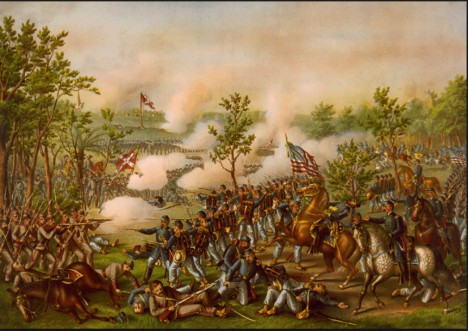Previous Post: Return to the Army
Little Doctor on the Black Horse
Battle for Atlanta
by Harriott Benedict Wickham Barton
.
It was nearly the first of August before orders came to rejoin the army slowly fighting its way south to Atlanta.
“Camp 17th O.V.I., near Atlanta, Aug. 14/64 – I am writing, lying flat on my stomach behind a heavy breastwork, 50 yards behind our regiment. It is safe from rifle fire and cannon, unless an artillery shell should burst directly overhead. Last Wednesday we occupied a very dangerous place where the 31st Ohio had just lost 2 men. Our men and Rebs agreed not to shoot but the sharp shooters were on the lookout for officers. Toward dark, our adjutant stepped out and got a ball through his head. All is quiet now. Our boys and the Johnnies are as friendly as can be. We have been trading coffee for tobacco with them. But now their officers will not permit them to trade, as so many desert. When we shoot, we holler over and tell them to lie low, and when we are done, we holler, ‘The war is over. Bring on your tobacco, Johnnies.’”

Battle of Atlanta
With most of the South now in Union hands, there was a feeling of despair in Rebel ranks. This feeling was shared by some high officers, and the governor of Georgia, but President Davis still talked of victory.
“It is reported that a Reb brigade got permission to charge our works, but when they got most up they threw down their arms, and ran into our lines. Their battery opened up on them with grape and canister, killing and wounding many. Over 600 got in safely. We are so close together now, and since we have stopped shooting, we get a great many. The Johnnies would come down to a spring. Our boys would meet them there, give them some clothes, and they would come back with us. Now the Reb officers have ordered their men to shoot if we start out. Got none today.”
“Aug. 28/64 – Two days ago, at 2 A.M., we started. Troops were moving all night. We are cut off from communication and bound for Dixie. The enemy falls back as we advance. I think we are on the eve of a big fight; it seems just like Chickamauga. When the army moved yesterday, I fell a little behind, to tend a sick man. I circled out through the fields to catch up to my place, and near a barn, seated on a pie of straw, sat Gens. Sherman and Thomas, eating their dinner. I saw they had hard tack. Sherman looked rather cross, but Papa Thomas was sedate and thoughtful as usual. He is a man who says little and that right to the point; but still if even a private goes to him about something he doesn’t understand and has a right to know, Tommy will explain to the minute detail. I hear that Sherman was not pleased because the Army of the Cumberland did not get into place sooner. He thinks there is none like the Army of the Tennessee. I think Thomas would stick up for the Cumberland, though I think they were very slow starting.”
NEXT POST: The Fall of Atlanta
 About the Author: Harriott Benedict Wickham Barton (1890-1981) was born in Norwalk, Ohio to Frank and Agnes Wickham. Her father was the youngest of twelve children of Frederick and Lucy Wickham, early settlers of the Firelands, and her mother was the great-great granddaughter of Platt and Sarah Benedict, who founded the city of Norwalk. Educated at Norwalk High School and Wooster College, she became a teacher. She marched as a suffragette and worked for the Labor Department during World War I. After the war, she went west to teach school, and became one of the last homesteaders, proving up a property near Wheatland, Wyoming. She married Angus Barton in 1924 and they raised four children on the homestead through the Dust Bowl and World War II. In the late 1940s, she and her Angus moved to Ohio, where they spent the rest of their lives. During the 1950s and ‘60s, she wrote “Little Doctor on the Black Horse,” poetry, and short stories, some which were published in various journals and magazines.
About the Author: Harriott Benedict Wickham Barton (1890-1981) was born in Norwalk, Ohio to Frank and Agnes Wickham. Her father was the youngest of twelve children of Frederick and Lucy Wickham, early settlers of the Firelands, and her mother was the great-great granddaughter of Platt and Sarah Benedict, who founded the city of Norwalk. Educated at Norwalk High School and Wooster College, she became a teacher. She marched as a suffragette and worked for the Labor Department during World War I. After the war, she went west to teach school, and became one of the last homesteaders, proving up a property near Wheatland, Wyoming. She married Angus Barton in 1924 and they raised four children on the homestead through the Dust Bowl and World War II. In the late 1940s, she and her Angus moved to Ohio, where they spent the rest of their lives. During the 1950s and ‘60s, she wrote “Little Doctor on the Black Horse,” poetry, and short stories, some which were published in various journals and magazines.
Thanks for visiting! Share and like this post below, and on Facebook. Let me know what you think in the comments. I’d love to hear from you!
© 1961 by Harriott Benedict Wickham Barton. All rights reserved.
Filed under: Civil War | Tagged: Battle for Atlanta, Civil War, David DeForest Benedict |




Leave a comment